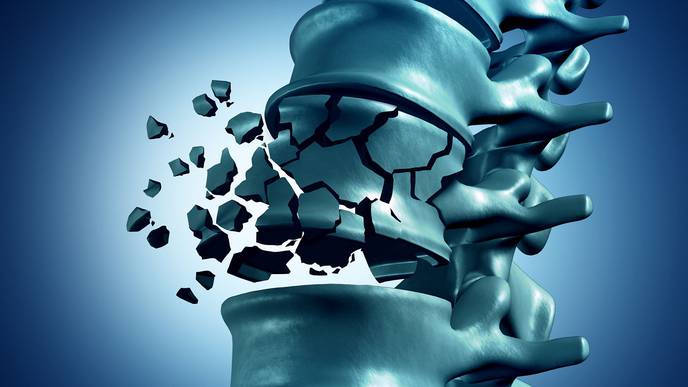Be Well: Keep Your Bones Strong to Prevent Osteoporosis

05/22/2023
Fox News Flash top headlines are here. Check out what's clicking on Foxnews.com.
May is National Osteoporosis Awareness and Prevention Month. The very common condition of osteoporosis occurs when the body doesn’t create enough bone tissue to keep up with the amount that is absorbed by the body — resulting in weak, brittle bones.
The disease affects around 10 million Americans, with another 44 million at risk of developing it, according to the Bone Health & Osteoporosis Foundation (BHOF), headquartered near Washington, D.C.
Nearly 20% of women aged 50 and over have the disease, along with almost 5% of men aged 50 and over, the Centers for Disease Control and Prevention states.
The good news is that the condition is largely preventable.
OSTEOPOROTIC FRACTURES POSE SERIOUS HARM TO MEN, TOO: STUDY
People with osteoporosis are more susceptible to sudden and unexpected bone fractures, said Dr. Ardeshir Hashmi, chief of geriatrics for Cleveland Clinic.
Nearly 20% of women aged 50 and over have the disease, along with almost 5% of men aged 50 and over.(iStock)
Most people aren’t aware they have osteoporosis until they experience a fracture.
"Unfortunately, most people find out the hard way," Dr. Hashmi said in a statement provided by Cleveland Clinic.
"They don’t think they’ve ever broken anything before and they say, ‘Well, the fall wasn’t as bad as I thought it would be. I didn’t think I would get these fractures,’ and yet there they are with a fracture."
BE WELL: PREPARE A DINNER RICH IN VITAMIN D FOR GOOD HEALTH
"By definition, that fragility fracture means you have osteoporosis."
The key to minimizing bone loss is to start implementing healthy habits as early in life as possible, Hashmi said.
These include eating foods rich in calcium, protein and vitamin D; taking bone-strengthening supplements such as vitamin D; and exercising regularly.
Eating foods rich in calcium, protein and vitamin D; taking bone-strengthening supplements like vitamin D; and exercising regularly can reduce the risk.(iStock)
Some of the best foods for bone health are fish (salmon, mackerel, tuna and sardines), dairy products (low-fat and non-fat milk, cheese and yogurt), fruits, green leafy vegetables and foods fortified with calcium and vitamin D, per the BHOF.
Most people aren’t aware they have osteoporosis until they experience a fracture.
Certain foods and drinks can put you at greater risk of bone loss and should be consumed in moderation.
These include salty foods, alcohol and caffeinated beverages. Smoking also increases the risk.
When it comes to exercise, Hashmi suggested a combination of aerobic training (cardio) and strength training (weights).
For those who are concerned, Hashmi said it’s important for people to talk to their physician about scheduling a bone density scan. (iStock)
Even small amounts of exercise are beneficial — and it doesn’t have to happen at the gym. Try incorporating small bursts of movement into your daily routine, the doctor suggested.
Walking, climbing stairs, riding a bike, dancing or even gardening are all decent ways to increase physical activity and help keep bones strong.
CLICK HERE TO SIGN UP FOR OUR HEALTH NEWSLETTER
"For some people, it’s even water-type exercising, like aquatic therapy or swimming," Hashmi said. "The resistance comes from the counter-pressure of the water. So, if I was in the pool just walking around, that would give me some strength training and some aerobic exercise as well."
CLICK HERE TO GET THE FOX NEWS APP
For those who are concerned that they’re at risk of osteoporosis or may already have it, Hashmi said it’s important to talk to a physician about scheduling a bone density scan.
For those who are diagnosed, medications can help strengthen bones and reduce the risk of fractures.
To read more pieces in Fox News Digital's "Be Well" series, click here.
Melissa Rudy is health editor and a member of the lifestyle team at Fox News Digital.

Facebook Comments